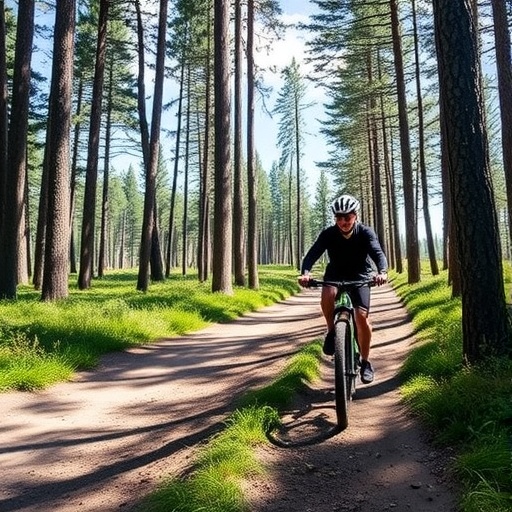Outdoor recreation voluntary associations (ORVAs) are fundamental pillars in the stewardship and management of trail systems throughout North America. These community-driven organizations are responsible for the creation, upkeep, and regulation of trails that facilitate a variety of outdoor activities. However, contemporary challenges such as climate change and volunteer burnout are threatening the resilience and sustainability of winter trail-based recreation. A recent collaborative study between the University of Eastern Finland and Lakehead University in Canada sheds light on these pressing issues, with a particular focus on fat biking, a burgeoning winter sport gaining traction across North America and Nordic regions alike.
Fat biking involves the use of specialized off-road bicycles equipped with exceptionally wide tires designed to traverse difficult terrains such as snow and sand. This innovation allows riders to extend recreational cycling into the winter months, transforming traditional perceptions of seasonal limitations. As fat biking grows in popularity, it has emerged not only as a recreational activity but also as a significant driver of winter tourism. The burgeoning interest in fat biking offers new economic and social opportunities, yet it also introduces complex challenges that demand sophisticated management responses from ORVAs.
Published in the Journal of Outdoor Recreation and Tourism, the study investigates fat biking’s role as an adaptive strategy amid climate variability in Northwestern Ontario and Northeastern Minnesota. These regions exemplify climates experiencing significant shifts in snowfall patterns, temperature fluctuations, and the frequency of anomalous severe weather events. The research methodology involved an extensive survey and in-depth interviews with both fat bikers and volunteers engaged in trail maintenance and event organization, providing a comprehensive understanding of the sport’s growth and the stresses upon volunteer infrastructures.
Professor Harvey Lemelin from Lakehead University emphasizes that despite its relatively recent emergence, fat biking faces the same vulnerabilities common to winter sports impacted by climate change. Unpredictable snow accumulation, reduced winter duration, and intermittent severe weather events not only disrupt trail usability but also impose additional logistical and labor demands on volunteer groups responsible for trail grooming and event facilitation. The cascading effects of these environmental changes intensify resource scarcity and operational pressures on ORVAs.
Volunteer burnout is identified as a critical threat to the sustainable management of winter trail systems. The study reveals that as snow years become heavier or more erratic, volunteers must commit more time and effort to trail grooming and infrastructure maintenance, often without corresponding increases in assistance or organizational support. These strains are compounded by the absence of effective recruitment and retention mechanisms within volunteer organizations, resulting in a shrinking pool of available and willing participants to uphold trail networks.
While fat bikers express appreciation for the dedication and effort volunteered toward trail management, a significant portion—over 40%—indicate reluctance to engage as volunteers themselves. This discrepancy highlights a growing disconnect between user enthusiasm and active volunteerism, intensifying the risk that trail systems will become underserved and potentially degraded. Without innovative strategic interventions, the cumulative pressure of climate disruption and volunteer fatigue may overwhelm the volunteer base central to winter recreation infrastructure.
To counter these emerging challenges, the researchers advocate for a suite of management strategies aiming at both operational efficiency and volunteer sustainability. Establishing seasonally adaptive trail grooming schedules can optimize trail availability relative to variable snow conditions. Enhancing volunteer recruitment with focused retention initiatives can mitigate burnout risks. The rotation of event hosting duties among various groups helps distribute operational load more equitably, easing volunteer workload concentration. Additionally, fostering binational or biannual events can showcase regional trail systems on a larger scale while moderating localized volunteer strain.
Crucially, the implementation of volunteer recognition programs and succession planning is recommended to institutionalize a culture of appreciation and continuity within ORVAs. These mechanisms can nurture long-term volunteer engagement, ensuring a stable stewardship foundation. By adopting these recommendations, ORVAs stand better positioned to maintain safe, well-groomed trails and sustain the momentum of fat biking as an accessible, climate-resilient winter sport.
Beyond the North American context, the study’s findings resonate with regions exhibiting similar climatic profiles and winter recreation histories, such as Finland’s Lakeland Region, Sweden’s Jämtland and Västerbotten, and Norway’s Nordland and Troms. The parallels suggest that adaptive strategies rooted in volunteer management and climate-responsive trail governance are universally applicable in sustaining high-quality winter outdoor recreation amid growing environmental uncertainties.
Kelsey Johansen, lead postdoctoral researcher at the University of Eastern Finland, underscores that irrespective of geographic location, volunteer-based associations must evolve to meet the complex interplay of recreational demand, climate fluctuations, and human resource limitations. Integrating strategic planning and cross-regional collaborations can help ensure the resiliency of winter sports infrastructures, safeguarding their role in local communities and tourism economies.
The scientific inquiry was generously supported by the UEF Water research programme, with funding from the Saastamoinen Foundation, the Jenny and Antti Wihuri Foundation, and the Olvi Foundation. Their contribution underscores the increasing recognition of sustainable outdoor recreation as an integral component of environmental research and community well-being.
This research invites policymakers, outdoor enthusiasts, and volunteer coordinators to rethink traditional frameworks in trail management, emphasizing adaptability, shared responsibility, and innovation. As fat biking continues to evolve as a winter sport, its long-term viability hinges not only on environmental conditions but on the structural capacities and social dynamics of the volunteer networks sustaining it.
The study eloquently illustrates the multifaceted challenges posed by climate disruption and human factors in outdoor recreation governance. It advocates a holistic approach to sustaining winter trail systems—one that synergizes environmental science, volunteer management, and community engagement to forge resilient landscapes for recreation and tourism well into the future.
Subject of Research: Outdoor Recreation, Climate Change, Volunteer Management, Winter Sport Adaptation, Fat Biking
Article Title: Is winter coming? Outdoor recreation voluntary associations and fat biking in Northwestern Ontario and Northeastern Minnesota
News Publication Date: 26-Sep-2025
Web References: DOI link
References: Journal of Outdoor Recreation and Tourism
Keywords: Fat Biking, Volunteer Burnout, Climate Change, Outdoor Recreation Voluntary Associations, Trail Management, Winter Tourism, Sustainable Recreation, Climate Adaptation, Snow Sports, Northwestern Ontario, Northeastern Minnesota, Tourism Events




